Signature Accomplishments
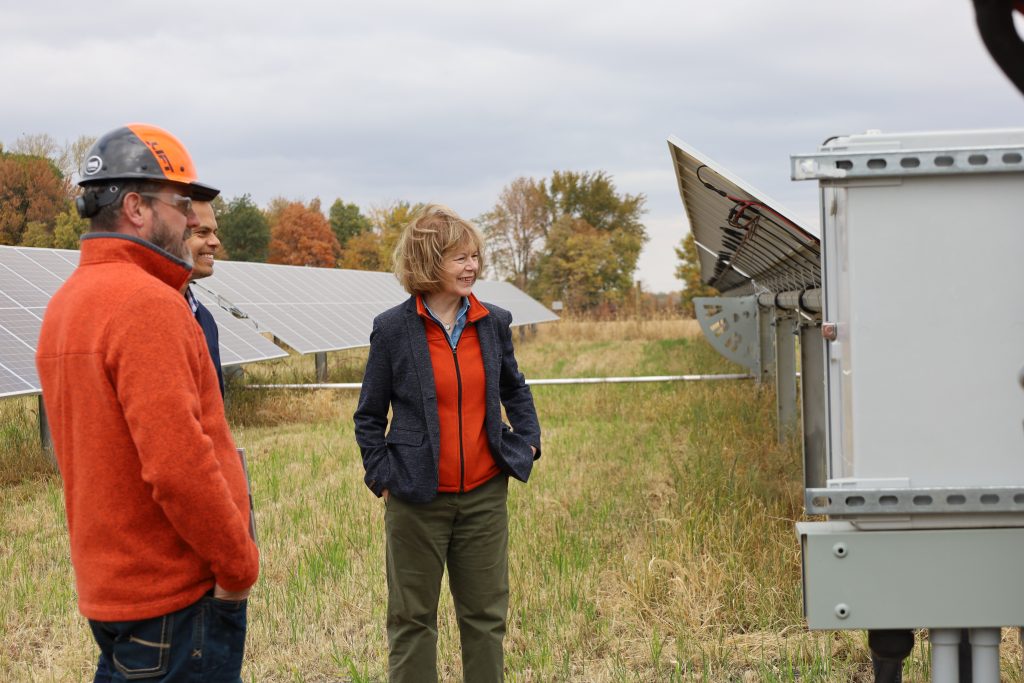
Passing the most significant climate legislation in U.S. History
Senator Smith played a key role in securing major climate and energy provisions in the Inflation Reduction Act, including tax credits for clean energy technologies, direct pay to make tax credits work for nonprofits, and funding for REAP and for rural electric cooperatives to transition to clean energy. REAP stands for Renewable Energy for America Program and provides financial assistance to agricultural producers and rural business owners to install renewable energy systems and adopt energy efficiency measures. The Inflation Reduction Act also includes funding for transmission buildout and siting, new credits for sustainable aviation fuel, a 10-year extension on biofuel credits, support for climate-smart agriculture and disadvantaged communities, funding to electrify ports, and residential clean energy credits.
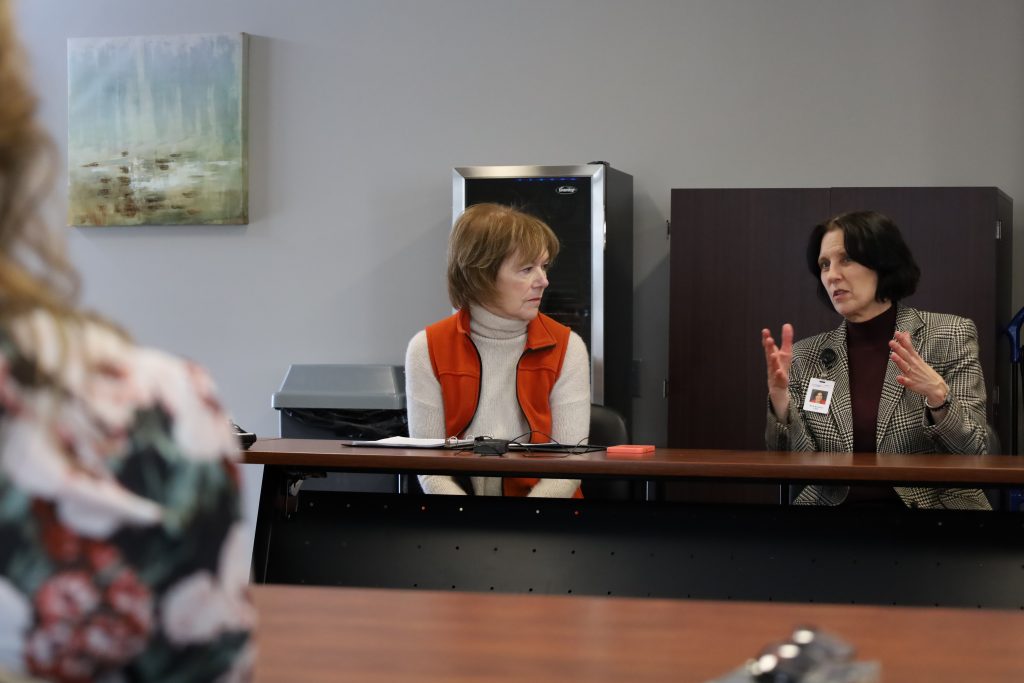
Improving Access to Mental Health Services
Senator Smith had two bipartisan mental health care bills signed into law as part of the 2022 government funding bill. The Improving Access to Behavioral Health Integration Act provides funding for primary care practices to implement evidence-based programs to integrate mental health care into primary care. The Native Behavioral Health Resources law establishes grants for Tribal governments, Tribal organizations, urban Indian organizations, and Tribal health programs to receive funds for culturally competent mental and behavioral health services for Native Americans.

Lowering Prescription Drug Costs
Since her first day in office, Senator Smith promised Minnesotans she would work to reduce the cost of prescription drugs. Her provisions included in the 2022 government funding bill will lower prescription drug costs by speeding up the development of lower-cost generic drugs, streamlining the approval process for drugs, and incentivizing domestic manufacturing of generics and biosimilars.
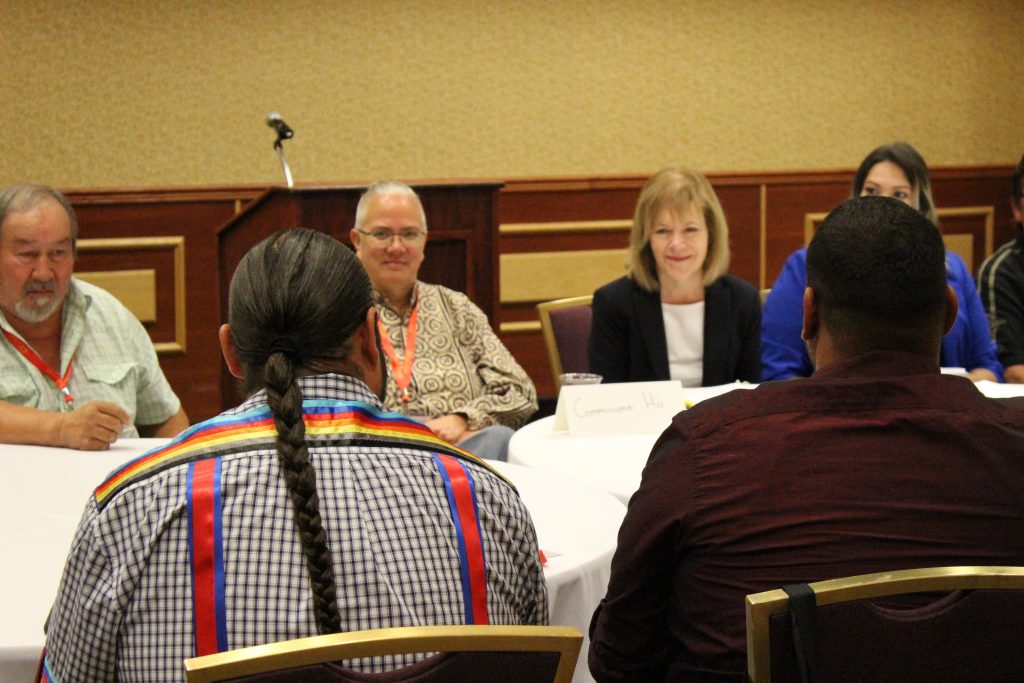
Justice for Native Survivors of Sexual Violence
An alarming number of Native people are survivors of sexual violence committed by non-Native people on Tribal land. Sen. Smith’s bill was included in the Violence Against Women Act Reauthorization and will help bring justice to Native survivors by restoring Tribal Nations’ rights to prosecute crimes of sexual violence—including assault, trafficking and stalking.
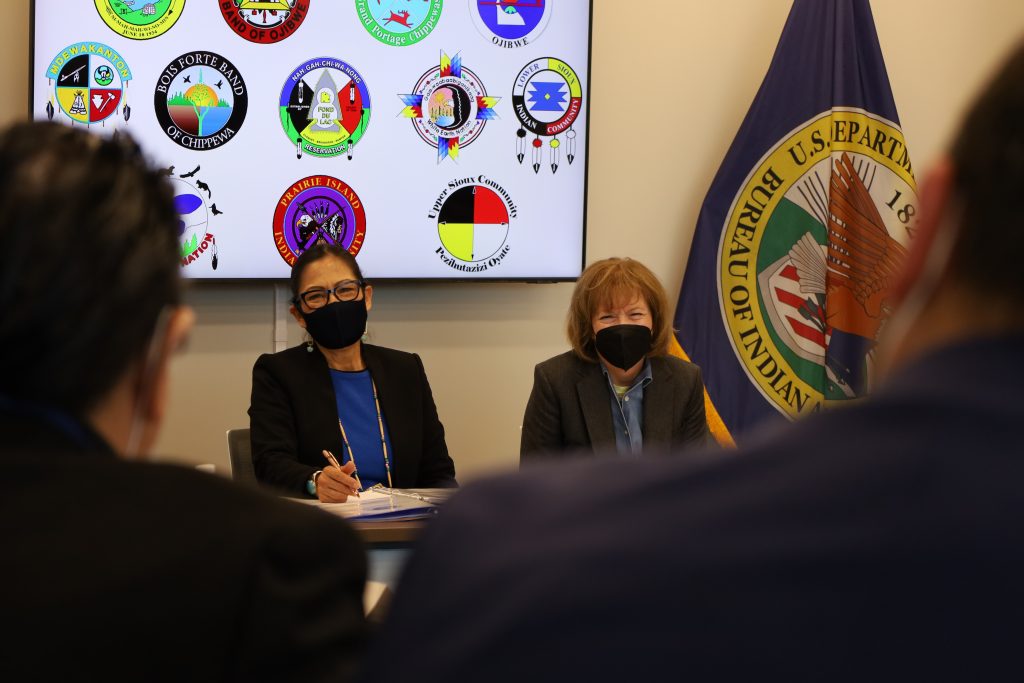
Returning Wrongly Seized Land to the Leech Lake Reservation
Sen. Smith authored a law, signed by President Trump in December 2020, to restore wrongly seized land to the Leech Lake Reservation in Northern Minnesota. The restoration of land to the Reservation came after decades of work by Tribal leaders of the Leech Lake Band of Ojibwe who will use the land to benefit future generations, including addressing the lack of housing on the Reservation.
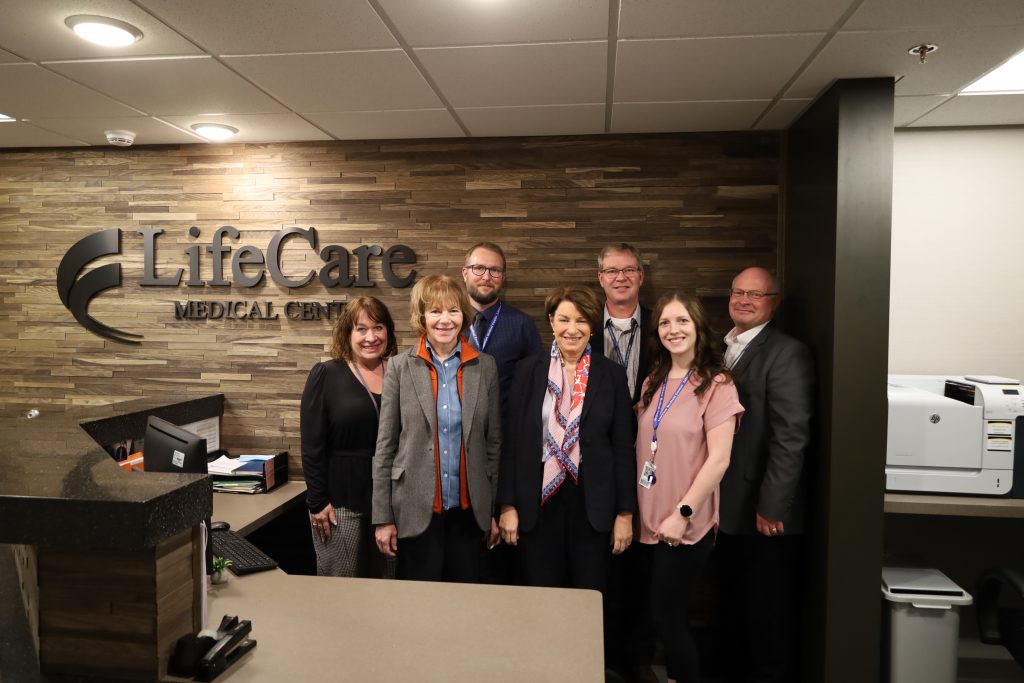
Reducing Maternal Deaths in Rural Areas
The United States is the only industrialized country in the world with an increasing maternal mortality rate. This issue disproportionately impacts communities of color and is particularly striking in rural America. 60 percent of maternal mortality is preventable, and the Rural MOMS Act takes important first steps in understanding the root causes of this problem and developing solutions to improve maternal care in rural America. This includes establishing a new training demonstration and investing in grants to expand prenatal, labor, birthing and postpartum services.
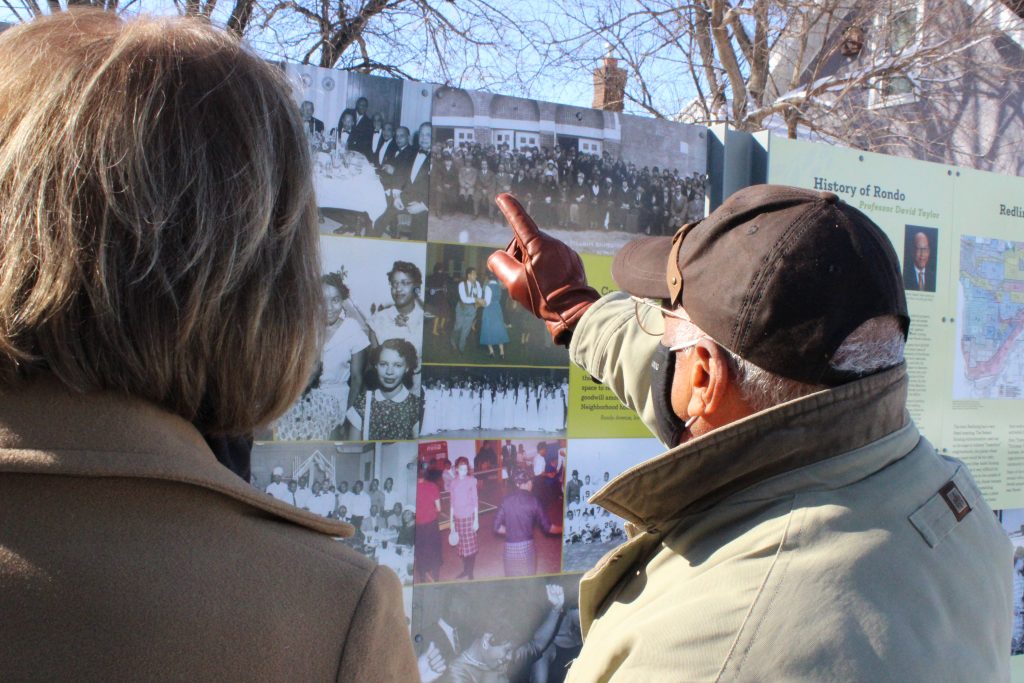
Making Juneteenth a National Holiday
As part of her push for racial justice, Sen. Smith worked with a bipartisan group of Senators, including Sens. Ed Markey (D-MA), Cory Booker (D-NJ), and John Cornyn (R-TX) to enact legislation to make June 19, known as “Juneteenth,” an official Federal holiday. Juneteenth commemorates the end of slavery in the United States and previously was not recognized by every state. Congress enacted Sen. Smith’s legislation, the Juneteenth National Independence Day Act, in June 2021 to ensure the nation officially recognizes the historic importance of the day.

Lowering the price of insulin
In 2019, when the skyrocketing price of insulin was having harmful, sometimes fatal, impacts on the ability of some Minnesotans with diabetes to afford their life-saving prescribed doses, Sen. Smith worked with Republican Senator Bill Cassidy of Louisiana to enact a bipartisan measure that lowers the price of insulin by promoting competition and bringing lower-cost products to market sooner.

Passing the most significant climate legislation in U.S. History
Senator Smith played a key role in securing major climate and energy provisions in the Inflation Reduction Act, including tax credits for clean energy technologies, direct pay to make tax credits work for nonprofits, and funding for REAP and for rural electric cooperatives to transition to clean energy. REAP stands for Renewable Energy for America Program and provides financial assistance to agricultural producers and rural business owners to install renewable energy systems and adopt energy efficiency measures. The Inflation Reduction Act also includes funding for transmission buildout and siting, new credits for sustainable aviation fuel, a 10-year extension on biofuel credits, support for climate-smart agriculture and disadvantaged communities, funding to electrify ports, and residential clean energy credits.

Improving Access to Mental Health Services
Senator Smith had two bipartisan mental health care bills signed into law as part of the 2022 government funding bill. The Improving Access to Behavioral Health Integration Act provides funding for primary care practices to implement evidence-based programs to integrate mental health care into primary care. The Native Behavioral Health Resources law establishes grants for Tribal governments, Tribal organizations, urban Indian organizations, and Tribal health programs to receive funds for culturally competent mental and behavioral health services for Native Americans.

Lowering Prescription Drug Costs
Since her first day in office, Senator Smith promised Minnesotans she would work to reduce the cost of prescription drugs. Her provisions included in the 2022 government funding bill will lower prescription drug costs by speeding up the development of lower-cost generic drugs, streamlining the approval process for drugs, and incentivizing domestic manufacturing of generics and biosimilars.

Justice for Native Survivors of Sexual Violence
An alarming number of Native people are survivors of sexual violence committed by non-Native people on Tribal land. Sen. Smith’s bill was included in the Violence Against Women Act Reauthorization and will help bring justice to Native survivors by restoring Tribal Nations’ rights to prosecute crimes of sexual violence—including assault, trafficking and stalking.

Returning Wrongly Seized Land to the Leech Lake Reservation
Sen. Smith authored a law, signed by President Trump in December 2020, to restore wrongly seized land to the Leech Lake Reservation in Northern Minnesota. The restoration of land to the Reservation came after decades of work by Tribal leaders of the Leech Lake Band of Ojibwe who will use the land to benefit future generations, including addressing the lack of housing on the Reservation.

Reducing Maternal Deaths in Rural Areas
The United States is the only industrialized country in the world with an increasing maternal mortality rate. This issue disproportionately impacts communities of color and is particularly striking in rural America. 60 percent of maternal mortality is preventable, and the Rural MOMS Act takes important first steps in understanding the root causes of this problem and developing solutions to improve maternal care in rural America. This includes establishing a new training demonstration and investing in grants to expand prenatal, labor, birthing and postpartum services.

Making Juneteenth a National Holiday
As part of her push for racial justice, Sen. Smith worked with a bipartisan group of Senators, including Sens. Ed Markey (D-MA), Cory Booker (D-NJ), and John Cornyn (R-TX) to enact legislation to make June 19, known as “Juneteenth,” an official Federal holiday. Juneteenth commemorates the end of slavery in the United States and previously was not recognized by every state. Congress enacted Sen. Smith’s legislation, the Juneteenth National Independence Day Act, in June 2021 to ensure the nation officially recognizes the historic importance of the day.

Lowering the price of insulin
In 2019, when the skyrocketing price of insulin was having harmful, sometimes fatal, impacts on the ability of some Minnesotans with diabetes to afford their life-saving prescribed doses, Sen. Smith worked with Republican Senator Bill Cassidy of Louisiana to enact a bipartisan measure that lowers the price of insulin by promoting competition and bringing lower-cost products to market sooner.
Other Accomplishments
The Inflation Reduction Act is the most significant climate legislation in our nation’s history. Senator Smith’s leadership and commitment was instrumental in passing this historic legislation. When negotiations stalled, Senator Smith worked tirelessly to bring people together to find common ground, ensuring the bill included key provisions to address the climate emergency. The law will make a significant impact in reducing greenhouse gas emissions, mitigating the effects of climate change, and protecting the planet for future generations. Her leadership was reflected throughout the process and the final bill included several of Senator Smith’s provisions.
- Tax Credits for Clean Energy—The legislation includes tax credits for various clean energy technologies such as wind, solar, biofuels, sustainable aviation fuel, battery storage, nuclear, carbon capture, and critical minerals, and other technologies. Senator Smith played a crucial role in securing direct pay for these tax credits, making them more accessible and usable for nonprofits.
- Helping Rural Businesses Save Money on Energy—Over $1.7 billion was allocated to the Rural Energy for America Program (REAP) based on a bill led by Senator Smith and Representative Abigail Spanberger. REAP assistance can be used to improve energy efficiency, install renewable energy systems, and conduct energy audits. This helps agricultural producers and rural small businesses save money on their energy bills, improve their bottom line, and become more environmentally friendly.
- Investing in Rural Clean Energy—Supporting clean energy initiatives in rural communities fosters economic growth, lowers energy costs, preserves the environment, strengthens energy independence, and provides additional income opportunities for farmers. Senator Smith played a crucial role in the development of these provisions and the Inflation Reduction Act allocated $9.7 billion specifically for rural electric cooperatives to deploy renewable energy systems, zero-emission systems, and carbon capture and storage. The law also includes an additional $1 billion for electric service providers to install large-scale renewable energy.
- Improving Permitting Efficiency for Transmission Projects—Senator Smith worked on a provision that allocated $2 billion for building out transmission infrastructure and $760 million for transmission siting, which is the process of deciding where to build new power lines. This funding will help streamline the siting and permitting process, foster community and stakeholder engagement, promote environmental justice, and prioritize economic development in communities affected by construction to lower electricity costs and improve reliability.
- Supporting Clean Energy for Tribal Nations—The Inflation Reduction Act increased the loan authority for the Tribal Energy Loan Guarantee Program to $20 billion and provided $75 million to carry out the program. This provision was based on a bipartisan bill led by Senator Smith and Republican Senator Lisa Murkowski of Alaska. This program provides loan guarantees for energy development projects for Tribal Nations and aims to support and encourage the development of clean energy projects, including renewable energy generation, energy efficiency initiatives, and other innovative energy technologies. This helps Tribes advance their energy independence, create sustainable economic opportunities, and promote environmental stewardship within their communities.
The Infrastructure Investment and Jobs Act (IIJA) was a historic investment in our nation’s infrastructure. It’s improving the country’s roads, bridges, railways, and ports, expanding access to high-speed internet in underserved areas, ensuring clean and reliable water sources, and supporting the transition to a clean energy future. Senator Smith played a role in the bipartisan negotiations that helped pass this bill into law, helping to bring a multi-billion-dollar investments to Minnesota.
- Fixing Highways—Investing in the repair and improvement of highways promotes economic growth, ensures safer and more efficient travel for individuals and goods, and fosters connectivity and accessibility for communities across the country. Thanks to this legislation, Minnesota is expected to receive $4.5 billion in federal funding to fix Minnesota’s highways.
- Repairing Bridges—Fixing bridges is critical for ensuring public safety, maintaining efficient routes for the transportation of goods and individuals, and supporting economic growth. Minnesota is expected to receive $302 million for bridge replacement and repairs.
- Expanding Public Transit—Thousands of Minnesotans rely on public transit daily to get to work, school, local businesses, the doctor’s office and more. As chair of the Senate Subcommittee on Transit, Senator Smith understands expanding public transit does more than providing people with transportation options, it alleviates traffic congestion, reduces air pollution, and stimulates economic development. The IIJA is expected to provide $819 million to improve public transportation across Minnesota.
- Investing in Broadband—Expanding access to broadband is about leveling the playing field and ensuring that every individual, regardless of their zip code, has the same opportunities for education, health care, and economic success. Minnesota is expected to receive at least $100 million to provide broadband coverage across Minnesota, finally bridging the digital divide and bringing high-speed internet to every corner of our state.
- Money for Electric Vehicle Infrastructure—As the transition to clean energy gains momentum, investing in electric vehicle charging stations is crucial to building a sustainable and resilient transportation infrastructure. Expanding access to charging stations allows us to meet the growing demand for electric vehicles and accelerate the transition to a clean energy future, leading to reduced greenhouse gas emissions and improved air quality. Minnesota is expected to receive $68 million for electric vehicle charging stations. This investment not only supports the adoption of clean transportation but also drives innovation, creates jobs, and strengthens the overall economy.
When Sen. Smith first arrived in the Senate, she fought for and won a seat on the Senate Agriculture Committee. She joined forces with Minnesota farm leaders and quickly began work to pass a 5-year farm bill that works for Minnesota producers and is helping them get through the current difficult farm economy. When the law passed in late 2018, she successfully included several bipartisan provisions that will help farmers, ranchers and rural communities across the state.
- Expanding Assistance and Capacity for Small Meat and Poultry Processors—Senator Smith joined Republican Senator Jerry Moran of Kansas to include $100 million in the ARP to help small meat and poultry processors cover USDA fees to allow for increased capacity.
- Expanding Rural Broadband—As a long-time champion of expanding broadband internet services to communities in Minnesota and across the country who are being left behind without it, Sen. Smith’s Community Connect Grant Program was signed into law as part of the Farm Bill. It now provides broadband grants to rural communities who need it to create jobs and help families and schools.
- Expanding America’s Use of Renewable Energy—Smith led efforts to include the Agricultural Energy Programs Reauthorization in the energy section of the Farm Bill. It targets funding for Farm Bill energy programs including the Biobased Markets Program, the Biorefinery Assistance Program, the Biomass Research and Development Program, the Bioenergy Program for Advanced Biofuel and the Biomass Crop Assistance Program.
- Getting Returning Veterans Involved in Farming—Smith championed legislation that directs USDA to help returning veterans with obtaining agriculture jobs after they return from service.
- Protecting Soil and Water Quality—Smith successfully pushed to include the SOIL Stewardship Act in the Farm Bill and to reform the Conservation Stewardship Program to improve carbon sequestration, water quality and other conservation goals.
- Fixing a Tax Mistake that Threatened Rural Communities—Rural electric cooperatives help power the Rural American economy by providing affordable power to rural areas and investing in things like rural broadband, renewable energy and disaster cleanup in the communities they serve. When a mistake in the 2017 tax law threatened the tax exemption they need to keep electric rates low, Sen. Smith worked with Republican Senator Rob Portman of Ohio to get legislation to fix the mistake and ensure the exemption. Rural cooperatives power the homes and businesses for 1.7 million Minnesotans.
As a member of the Senate Education Committee, Sen. Smith has prioritized preparing Minnesotans for 21st Century jobs and has supported workforce training.
- Preparing Students for 21st Century Careers—Key provisions from Sen. Smith’s 21st Century Workforce Partnerships Act to recruit, license and train teachers and expand career exploration for students were included in the Perkins reauthorization bill signed into law in July 2018.
- Improving Military Readiness Training, Protecting the Environment in MN—Sen. Smith’s amendment, to the FY19 Defense Authorization bill protects the National Guard’s access to tens of millions of dollars in training and environmental protection grants. Camp Ripley is protecting over 700 acres of land through these grants.
- Ensuring People Aren’t Forced to Pay Current or Former Spouses’ Student Debt—The bipartisan bill allows individuals to sever joint consolidation loans with a former spouse, providing financial freedom for vulnerable individuals, including victims of domestic violence and financial abuse. The legislation addresses a gap in existing law that left many people responsible for their current or former spouses’ student loans and ineligible for loan forgiveness programs.
Sen. Smith has championed a transition to a clean energy economy that addresses climate change, puts the United States at the forefront of technology innovation and creates millions of good-paying jobs.
- Enabling Energy Storage—Key provisions from the bipartisan bill Sen. Smith led to promote energy storage were signed into law in December 2020. This includes funding to accelerate the development of innovative energy storage systems. Energy storage is the process of capturing energy at one time to use later, allowing energy providers to meet the needs of consumers and help optimize the use of renewable energy like wind and solar.
- Aid for Energy Projects on Tribal Land—Bipartisan provisions from Sen. Smith’s Tribal Energy Reauthorization Act were signed into law in December 2020. They modified the required cost share for energy projects funded through the Office of Indian Energy to account for the financial situation of Tribal applicants. The Inflation Reduction Act increased the available loan authority from $2 billion to $20 billion through 2028, and appropriated $75 million to carry out the program. Another improvement through this law includes the loans being able to cover the entire debt from these projects, rather than just 90 percent.
- Loggers Relief—Sen. Smith, along with Sen. Collins (R-Maine), championed the Loggers Relief Act, which was included in the COVID-19 relief package in December 2020. The final inclusions was for $200 million in funding for loggers who have been impacted by the pandemic.
As a member of the Senate Health Committee, Senator Smith has made securing affordable health care services for Minnesotans a top priority. From protecting coverage for people with pre-existing conditions, to expanding mental health and telehealth services, to expanding access for veterans, she has enacted many bipartisan provisions that are keeping people in Minnesota and across the country healthy. They include:
- Lowering Prescription Drug Costs—Since her first day in office, Senator Smith promised Minnesotans she would work to reduce the cost of prescription drugs. Her provisions included in the 2022 government funding bill will lower prescription drug costs by speeding up the development of lower-cost generic drugs, streamlining the approval process for drugs, and incentivizing domestic manufacturing of generics and biosimilars.
- Addressing the Public Health Workforce Shortage—Senator Smith’s bill, the Strengthening the Public Health Workforce Act, was included in the 2022 funding bill to reauthorize a public health workforce loan repayment program to incentivize health care workers to take jobs in a state, local, or Tribal public health department. This legislation will help address the public health workforce shortage by providing financial assistance to health care professionals who commit to working in public service. The law will ensure that financial assistance is distributed equitably across rural and urban areas.
- Securing Health Care for Veterans Exposed to Radiation—Senator Smith’s bipartisan bill, the Mark Takai Atomic Veterans Healthcare Parity Act, was part of the Sergeant First Class Heath Robinson Honoring Our PACT Act and ensures that veterans exposed to harmful radiation during their service will have access to VA care and benefits. Senator Smith’s bill specifically supports care for veterans involved in the cleanup of Enewetak Atoll on the Marshall Islands. These veterans were previously ineligible for health benefits despite their exposure to radiation during nuclear tests. The law will help provide proper care and support to these veterans who have suffered from high rates of cancer due to their service.
- Supporting Health Care in Rural Areas—Everyone should have access to affordable, high-quality health care, regardless of their zip code. Senator Smith worked with Republican Senator John Barrasso from Wyoming to pass the State Offices of Rural Health Reauthorization Act, which provides funding to state offices of rural health to help them improve the delivery of health care services in rural areas. The legislation supports State Offices of Rural Health by extending a successful law on information-sharing, technical assistance, and care delivery in rural communities.
- Improving Access to Mental Health Services—In 2018, Senator Smith’s bipartisan Improving Access to Mental Health Services Act was included in the bipartisan opioid package, the SUPPORT for Patients and Communities Act. Senator Smith’s bill ensures that mental health professionals in the National Health Service Corp now have the flexibility to practice in schools, at community-based organizations, and through home visits to better meet the needs of their patients and communities.
- Expanding Mental Health Services—With the dramatic increase in mental health needs during the pandemic, Senator Smith along with Republican Senator Lisa Murkowski of Alaska pushed hard to include emergency funding for local behavioral health needs. Their bipartisan efforts provide $50 million to address local mental health needs in Minnesota and across the country by providing funds for training, technology upgrades, surge capacity needs, emergency crisis intervention, suicide prevention and outreach to underserved communities.
- Providing Emergency Support for Addressing Substance Use Disorders—Senator Smith once again joined forces with Senator Lisa Murkowski to include $30 million in the American Rescue Plan to help local efforts to address substance use disorders across the country. This was an unpreceded investment in harm reduction by Congress and will help increase access to a range of community harm reduction services and support service providers as they work to help prevent overdose deaths and reduce health risks often associated with substance use.
- Addressing Social Isolation for Older Adults—The coronavirus pandemic greatly exacerbated the social isolation many older adults were already feeling. Senator Smith successfully pushed to include provisions in the American Rescue Plan Act from her Strengthening Social Connections Act to address the negative health effects of social isolation and loneliness.
- Preventing Social Isolation for Seniors—Even before the COVID-19 pandemic, Senator Smith recognized how the increasing problem of social isolation and loneliness amongst seniors is contributing to negative impacts on their mental and physical health. She pushed for provisions in the Older Americans Act that would ensure there are services in place to allow states to better coordinate to address social isolation and loneliness among older Americans.
- Meeting Health Care Needs in Rural Minnesota—Senator Smith worked with several Republican and Democratic colleagues to pass the Rural Health Liaison Act, which created a Rural Health Liaison position at USDA to work with HHS to address health care needs specific to rural communities. The measure was one of several she passed as part of the 2018 Farm Bill.
- Strengthening Services for Native Elders—Native American elders face significant health disparities compared to the general population. Senator Smith’s provision in the Older Americans Act gave Tribal organizations the ability to provide a wider range of home and community-based health services to Indigenous elders, including transportation, case management and health and wellness programs.
- Protecting Federal Health Services During Government Shutdowns—When a prolonged federal government shutdown endangered benefits for some Minnesota families having life-changing events like the birth or adoption of a child, Senator Smith secured passage of a measure to allow them to enroll their dependents in federal health coverage – even during a shutdown. A second measure she authored ensures that federal employees’ dental, vision and long-term care coverage continue during a shutdown. The President signed both of these bills into law in 2019.
- Preventing Practices that Keep Prescription Prices High—In April 2021, President Biden signed into law a bipartisan measure from Sens. Smith and Cassidy called the Ensuring Innovation Act. The law prevents pharmaceutical companies from engaging in “evergreening,” which allowed them to extend their drug patents for five years after making minor, insignificant changes to a drug. Evergreening allowed drug makers to avoid competition by blocking cheaper generic drugs from the market and keeping their profits as high as possible. The new law empowers the federal Food and Drug Administration to stop it.
- Preventing Lyme Disease—With the number of Lyme disease cases on the rise, Senator Smith worked with Republican Senator Susan Collins of Maine to improve research, prevention, diagnostics and treatment for vector-borne diseases, which are spread by ticks, mosquitoes and fleas. The bill was signed into law in 2019.
- Strengthening Support Services for Native Elders—American Indian and Alaska Native adults over age 65 in the United States have higher mortality rates and are more likely to live in poverty and lack health care. So, Senator Smith worked with Republican Senator Lisa Murkowski of Alaska to strengthen support for these “elders” by adding a new grant program to the Older Americans Act enacted in 2020. The grants fund not only home-based and community-based service, but also support training programs and technical assistance.
- Understanding the Scope and Cost of the Insulin Affordability Crisis—In December 2020, with unaffordable insulin prices making it difficult for millions of Americans with diabetes to adhere to their insulin prescriptions – often with serious, even fatal consequences – Senator Smith secured passage of bipartisan legislation to understand the cost and scope of the problem. Her measure, introduced with Republican Senator Kevin Cramer of North Dakota, directs federal health officials to calculate the amount of taxpayer money that could be saved if diabetes patients didn’t need additional care because they are unable to afford their proper doses. It was signed into law in 2021.
As a member of the Senate Banking Committee, Sen. Smith has made addressing Minnesota’s housing shortage a top priority. In 2019, she led a statewide housing listening tour that found that virtually every community in the state has a shortage of quality, affordable places to live. The problem hurts families and businesses and prevents job growth and economic development.
- Providing Rural Housing Rental Assistance—After hearing from Minnesotans during her affordable housing listening sessions, Sen. Smith and Republican Senator Mike Rounds of South Dakota successfully enacted a bipartisan measure to extend the length U.S. Department of Agriculture (USDA) rental assistance contracts to give more certainty to affordable housing developers in rural areas. Before it became law, rental assistance contracts were only available for one year; now, rental assistance is available for 20 years.
- Improving Rural Housing Maintenance—Working with Republican Senator Marco Rubio of Florida in 2019, Sen. Smith passed a provision to ensure that USDA prioritizes maintenance and repairs so that rural families can have a safe, affordable place to live.
- Common Sense Regulations for Manufactured Homes—Smith worked with Senator Catherine Cortez Masto (D-NV) in 2019 to pass a bipartisan bill to require that any new regulation made by HUD take into account the impact of the new rule on owners of manufactured homes and on the production and sale of manufactured homes.
- Making Homeownership More Accessible to Native Families Living on Tribal Lands—When Native families living on trust land were finding it difficult to access federal home loan guarantees, Sen. Smith teamed up with Republican Senator Mike Rounds of South Dakota to enact their Native American Housing Affordability Act to reduce bureaucratic delays and make it easier for families to achieve homeownership on Tribal lands. The measure passed in December 2020 as part of the year-end budget package.
- Giving Tribes Access to Funds to Address Homelessness—When Tribal leaders in Minnesota shared that they were not eligible to apply for federal funds to combat significant levels of homelessness and housing insecurity, Sen. Smith joined with Republican Senator Lisa Murkowski of Alaska to change that. Their bipartisan bill—the Tribal Access to Homeless Assistance Act— was included in the budget package enacted in December 2020 to allow Tribes to apply for homeless assistance funds.
- Protecting Consumers—Senator Smith believes protecting consumers in the financial marketplace is vital to prevent significant financial losses, maintain consumer confidence, and ensure fair and efficient operation of the economy. Her bipartisan legislation with Republican Senator Thom Tillis of North Carolina was included in the 2022 funding bill ensure investors considering purchasing Registered Index Linked Annuities (RILAs) have clear and direct information that strengthens their understanding of the financial product.
- Addressing Disparities for Native Americans—As a member of the Senate Committee on Indian Affairs, Senator Smith understands the importance in addressing disparities Native communities face. A number of key Tribal provisions she authored or championed were included in the 2022 funding bill to promote homeownership, mental and behavioral health services, and increase funding for the Indian Health Service. These provisions include establishing grants for culturally competent mental and behavioral health services, providing parity for Tribal courts in dividing retirement plan assets, advancing appropriations for the Indian Health Service, and helping Native families in rural areas achieve homeownership.
- Addressing Terrorism Risk to Help MN’s Economy—Senator Smith’s bipartisan measure to extend the Terrorism Risk Insurance Program, introduced with Republican Senator Thom Tillis of North Carolina, was signed into law in 2019. Giving Minnesota institutions access to affordable insurance for terrorism-related risks makes it possible for them to grow and create jobs. Her measure will enable Minnesota to continue to host major events, such as the 2018 Super Bowl. It also applies to the ordinary operations of other large public buildings, such as the Mall of America.
- Protecting Credit Union Employees and Members—After hearing from Minnesota credit union employees about harassment and assaults, Senator Smith partnered with Republican Senator Ben Sasse of Nebraska to author a law to remove barriers that made it difficult for credit unions to expel members who violated major policies, such as theft, destroying ATMs and sexually harassing tellers. A longstanding federal law required credit unions to call a vote of their full membership to expel a member, even when the member had been engaged in egregious conduct. That process could lead to lengthy delays and burdensome administrative requirements. This law fixes this problem by allowing federal credit unions to expel members for violations of credit union policies without requiring a vote of membership.
- Shoring up Pensions for 22,000 Minnesotans—The ARP also includes provisions that Senator Smith pushed to shore up the multiemployer pension system and ensure workers receive the full pensions they earned. The provision stems from Senator Smith’s years-long push to resolve the nation’s looming multiemployer pension crisis, which threatened to cut drastically the hard-earned pensions for millions of Americans, including more than 22,000 Minnesotans.